#to lean into that western/midwestern 'industrious is alive'
Text
somebody really should take eddie camping
#like actual camping with hot dogs on a stick and a canoe#not just sleeping in har car which she is doing anyways—#or at least invite her so she can look at you funny and then#say 'but i have to work' girl no you do not have to work#she's just constantly at work because it's what she does#to lean into that western/midwestern 'industrious is alive'#which she was tragically and unfortunately raised with#by her grandparents in direct defiance of her mother who#could not hold down a job for more than two weeks
2 notes
·
View notes
Text
Ranking : Jim Jarmusch (1953 - present)
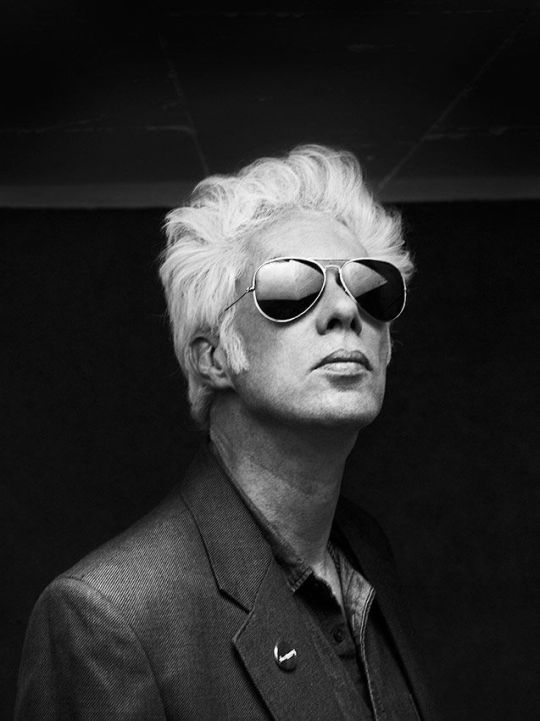
When you get someone adept at the art of filmmaking that can resonate at the highest vibrations when creating, that is a blessing in itself, but when you get a jack of all trades, everyman who is deeply observant and unabashedly humanist, and happens to make films to boot, then you start reaching the realms of Jim Jarmusch. As a Midwestern kid who studied at New York’s famed Columbia University before transitioning to a span in Paris, Jarmusch has the unique gift of deeply appreciating lofty art on the same level as outsider, underground art, and by understanding the context that connects all of them, his appreciation of time is enhanced by association. In a world that has become obsessed with taking in information with no intention of retention at a breakneck speed, it is refreshing to know that Jim Jarmusch has stood his ground in terms of deliberate pacing and tone.
Most of my Jarmusch familiarity came from the first half of his catalog, and it’d been years since I watched his work, so rather than rank what I remembered while trying to fit first watches in, I decided that the time was right to revisit the entire catalog. Doing so not only gave me a broader understanding of his overall vision, but it made me realize that a director with 25 years in the game is still capable of making drastic style shifts. Without further ado, here is my preferential ranking of the 13 Jim Jarmusch films available as of March 2021.

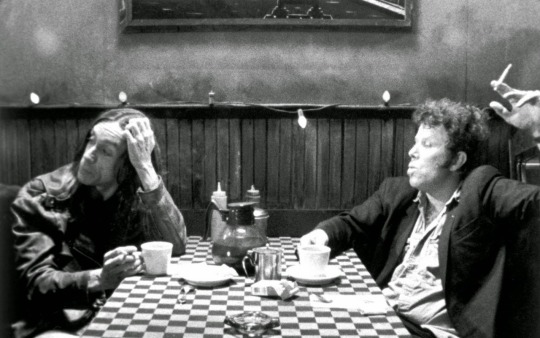
13. Coffee and Cigarettes (2003)
This isn’t a bad film, but Coffee and Cigarettes definitely reeks of a narrative-less venture. The best parts of Coffee and Cigarettes come in attempts at placing what was shot explicitly for the film, versus what was shot during the previous fifteen or so years that Jim Jarmusch directed other feature films. Taken as a collection of independent vignettes, the film is rich in memorable moments, but for a director so adept at unifying themes with incredible nuance, specifically within the obtuse hurdles presented by an anthology film, Coffee and Cigarettes feels much more like assorted pieces than a fractured whole. More so than an original idea, the movie feels like a deep cut that true fans will appreciate, casual fans can easily reference, and Jarmusch-laymen can use as an entry into deeper conversations. If nothing else, see Coffee and Cigarettes for the incredibly entertaining scene where Cate Blanchett acts circles around Cate Blanchett, but Cate Blanchett still does her thing.

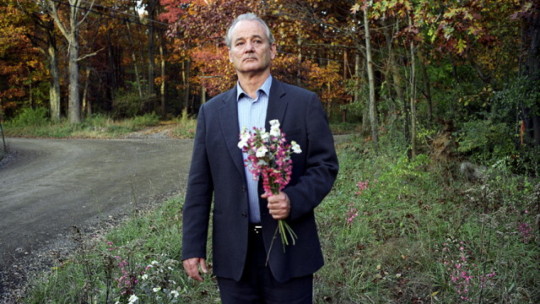
12. Broken Flowers (2005)
Bill Murray has been popular longer than I’ve been alive, but somewhere around the beginning of the 21st century, it seemed like the entire world caught Bill Murray fever in a major way. After a couple of iconic roles in films by Wes Anderson and Spike Jonze, his star was riding new and unfathomable highs, and that was right when Jim Jarmusch teased collaboration via Coffee and Cigarettes before diving headlong into it with Broken Flowers. Of all the Jim Jarmusch films, this one still feels the least like his style, at least in terms of purity. Most of its magic comes from surrounding Bill Murray with Jeffrey Wright as a human conscience, as well as a parade of memorable actresses the likes of Sharon Stone, Frances Conroy, Jessica Lange, TIlda Swinton, Chloë Sevigny and more. The film runs high on charm, and for any man staring at the Autumn of his years, the feelings of romantic regrets are likely relatable on some level. Interestingly, this project feels like one of the most accessible in the Jarmusch canon, perhaps because of its efficient production presentation. If there were ever a Jim Jarmusch date movie, it’s Broken Flowers.

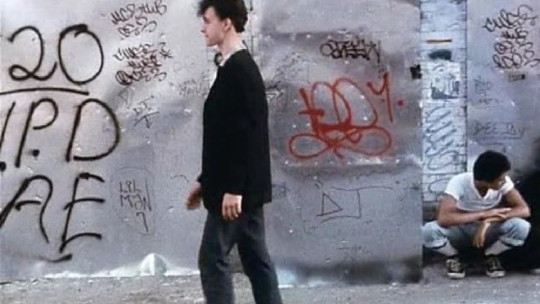
11. Permanent Vacation (1980)
Upon initial viewing, Permanent Vacation possesses many of the earmarks of a student film, such as limited locations, long passages with minimal dialogue, symbolic monologues in place of standard narrative dialogue, and isolated characters within the context of an implied bigger world. The strengths that the film possesses, however, are elements that became staples in Jim Jarmusch films : a protagonist either absent of motivation or driven from within, cross-cultural fascination and iconography and the aforementioned patient approach to narrative are some of the key ingredients in the Jarmusch recipe. As a unique voice in a burgeoning New York collective of filmmakers, it makes total sense that his debut would be both an ode to New York City and an ode to living life like an outsider in the mecca of culture. This film probably wouldn’t be the best place to start a curious party to the Jim Jarmusch canon, but it would certainly be one to circle back to if their interest is piqued… I would recommend this one to fans of Richard Linklater’s early work for sure.

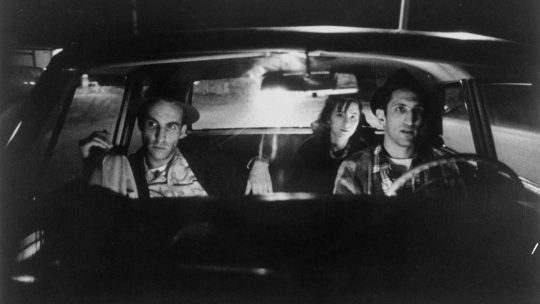
10. Stranger Than Paradise (1984)
Stranger Than Paradise marks the first of many black and white commercial releases from Jim Jarmusch. As a second film, it has everything you’d want to see from a director finding his place in the industry : the cinematography has evolved and incorporated more movement, Jarmusch is starting to let his personality shine through via musical choices, and the stories are evolving into more relatable narratives rather than ruminations on isolation (while simultaneously becoming much funnier). Jarmusch still isn’t afraid to let his films breathe, however, which leaves his distinct style present even among the areas of growth. The incorporation of a strong female lead presence (thanks to Eszter Balint’s brilliant performance) showed that Jarmusch had a full understanding when it came to presenting stories for everyone on the screen, rather than limiting his voice to male characters. The casting of John Lurie and Richard Edson opposite one another is kinetic both visually and in terms of performance, as each of their versions of uptight laid-backness compliment one another.

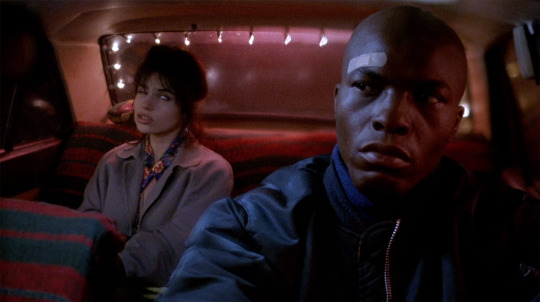
9. Night on Earth (1991)
Of the anthology films that Jim Jarmusch has created, Night on Earth is possibly my favorite. More so than any of the others, it captures the intriguing aspects of human nature by juxtaposing them directly against the very human tendency to judge books by their covers. With the vast majority of the film taking place in a handful of taxi cabs, we are left in the hands of the actors and actresses in the hopes that their interactions, chemistry and dialogues can keep us captivated, and the cast presented in the film completely stand up to the challenge in their pairings. Jarmusch also presents movie audiences with a way to show different worldly locations without having to lean on the cinematic and iconic shorthand that we are used to, such as the Hollywood sign, Times Square, the Eiffel Tower and so on… instead, we are shown places that locals would inhabit in all of their rundown and lived in glory, which in turn, amplifies the grounded realness of the interactions, as if we are looking at a fictional blueprint for what would later become the popular HBO series Taxicab Confessions. This film sits in-between two of Jim Jarmusch’s most iconic releases, so it is easy to see how this one could be easily lost in the shuffle, but it is certainly not a film to be missed, especially for those who would consider themselves Jarmusch fans.


8. Paterson (2016)
Jim Jarmusch brings a humble sense of humanity to all of his films, but Paterson stands out for its nuance, subtlety and confidence in its patience. ��Much like Forrest Gump or a less abstract Charlie Kaufman film, Paterson dwells in an interesting realm of an unknowingly wise protagonist tethered to the center of tornado-like emotions and experiences from all they encounter. Jarmusch manages to take this framework, dial down the absurdity to a sneaky degree, and ramp up the grounded elements to the point where a viewer cannot help but graft pieces of themselves onto the events presented. As a musician with a day job, I can also relate to Paterson’s displays of beauty found in redundancy, and the peace that comes with understanding intentions for creative expression, even if others see it in a different light that you do. While not the grandest of Jim Jarmusch gestures, it is without a doubt one of the most sincere and heartfelt of his selections.

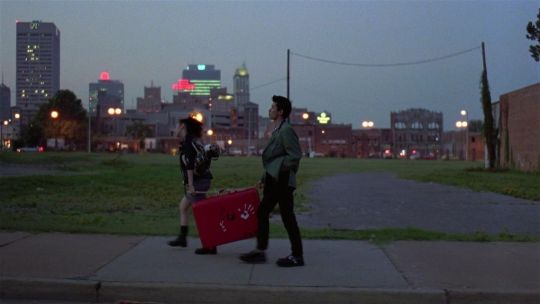
7. Mystery Train (1989)
Mystery Train marks the first definitive signs of Jim Jarmusch knowing, understanding and utilizing the tools he’d come to favor in a manner that seemingly resonated what he pictured in his head. Memphis as a setting provides the juxtaposition of beauty and urban decay captured in Permanent Vacation; placing our audience on a journey with two foreign tourists brings the worldly view introduced in Stranger Than Paradise; and, most importantly, all of the coolness and humor that thrived in Down by Law returns triumphantly. Jarmusch also puts anthology filmmaking on the table, which is important for two reasons… first and foremost, it would become a style he would go on to thrive in, returning to it immediately with Night on Earth and once more with Coffee and Cigarrettes… secondly, as for Mystery Train directly, it allowed Jarmusch to surround Masatoshi Nagase and Youki Kudoh (burgeoning stars Western audiences were unfamiliar with) and Nicoletta Braschi, and surround them with his talented friends like Steve Buscemi, Cinqué Lee, Rick Aviles, Vondie Curtis-Hall and Tom Noonan, as well as legendary musicians like Tom Waits, Joe Strummer, Screamin’ Jay Hawkins and Rufus Thomas. Between these high profile castings, the stylish cinematography and the heartfelt quirkiness of the leads, Mystery Train feels like the film where everything came together in the best ways possible.

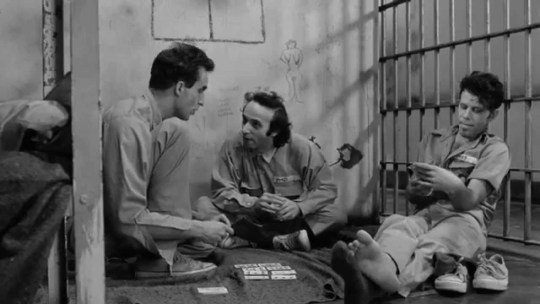
6. Down by Law (1986)
To my knowledge, Down by Law would be considered the breakout success of the Jim Jarmusch library. John Lurie returned to the fold to provide another performance infused with coolness, but this time around, up and coming Italian star Roberto Benigni and iconic recording artist turned actor Tom Waits share lead duties, forming an unlikely trio with monstrously dynamic on-screen chemistry. Jarmusch not only switched things up for himself by setting the film in New Orleans rather than centering it around New York, but he turned the jailbreak genre on its ear by focusing on the escapees rather than the escape itself. The conflict between Jack and Zack is seeded with their individual problems with women (which both include emasculating each man by chastising them for not using domestic violence), as well as each of them ending up framed prior to imprisonment, which makes Roberto the de facto peacemaker despite his huge language barrier. Down by Law marks the first time that edginess found its way into a Jim Jarmusch film, and while it never became his forte, it wasn’t the last time that element was key to a Jarmusch film.

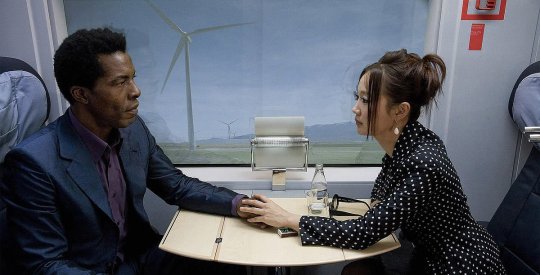
5. The Limits of Control (2009)
When reflecting on The Limits of Control, the word patience comes to mind : the patience of accepting repetition… the patience of a trilingual film with minimal dialogue… the patience of a film that shows much more than it tells. As a take on noir, the Jim Jarmusch variety brings to mind films like Le Samourai, where actions speak infinitely louder than words, choices come with a definitive set of consequences, and we as viewers are allowed to consider what we are presented with in real time, just like our protagonist. The coolness levels are also pushed to maximum levels in this film, but then, what’s a Jim Jarmusch film without a generous dose of cool in it? While it is never rightly stated, I like to pretend that The Limits of Control takes place in the same universe as Ghost Dog, with Raymond having evolved into The Lone Man using the tools left behind by Ghost Dog. Maybe it’s a bit of embellishment on my end, but it makes an already great film have that little extra touch of pizazz needed to stand out from the pack.

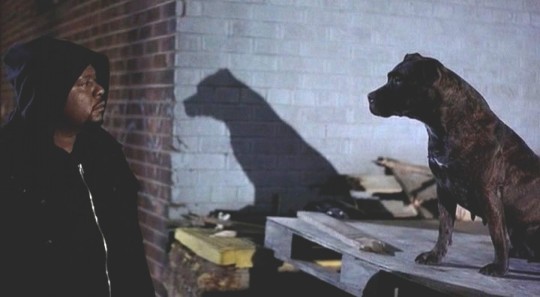
4. Ghost Dog: The Way of the Samurai (1999)
While Jim Jarmusch isn’t necessarily a household name, he is relatively well known, and for many familiar with his work, Ghost Dog: The Way of the Samurai served as the introductory film for them. The casting of Forest Whitaker in the lead role continued the trend of higher profile names joining the Jarmusch fold, and stylistically, the mixture of Ghost Dog’s hitman and samurai worlds with that of the mafia film (which was about to see a popularity resurgence in light of the recent premier of The Sopranos) was alive, kinetic, and rich with varied personalities. Ghost Dog: The Way of the Samurai also stood as an early example of RZA’s talents in the realm of scoring films, which would later go on to be a key element of Kill Bill: Vol. 1. For a movie with a more traditional approach, perhaps even the most accessible approach of all Jarmusch films, Ghost Dog: The Way of the Samurai is anything but conventional, and it’s the sense of pride it wears in its non-conventionality that makes it the cult classic it became.

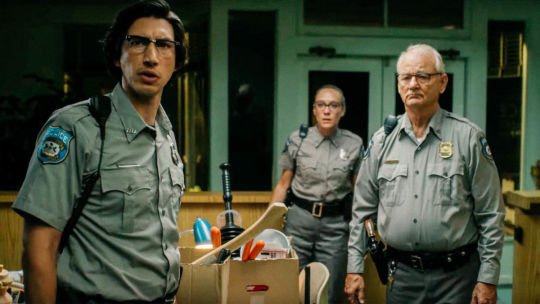
3. The Dead Don't Die (2019)
Not since Dead Man has Jim Jarmusch picked such a distinct genre for a film of his, or decided to include such a long list of high profile names in character roles. While the sense of doom that usually comes with zombie movies is present, Jarmusch sticks to his toolkit by focusing solidly on the human element during the early portions of the film where many people would already have zombies doing the narrative and visual heavy lifting, and in turn, the audience finds themselves drawn deeper and deeper into the story well before the undead arrive. Of all the Jarmusch films, The Dead Don’t Die has the rare designation of being the only one that seems to comment on film itself, be it references to iconic characters from other properties, ruminations on film as a format, or even discussions centered around film fandom. While most films tend to stay around from outright explanations of whatever the root cause of the zombies are, The Dead Don’t Die uses the vacuum as a brief opportunity to make a comment on polar fracking and other climate/environment-altering processes. Even the zombies get the most on-screen humanity received since the days of George Romero’s Dead series, a refreshing change of pace that has been often ignored in recent films centered around the undead. Films like this one prove that Jim Jarmusch has the capacity to make films about most anything, and the further he strays from his supposed comfort zone, the seemingly better the films get.

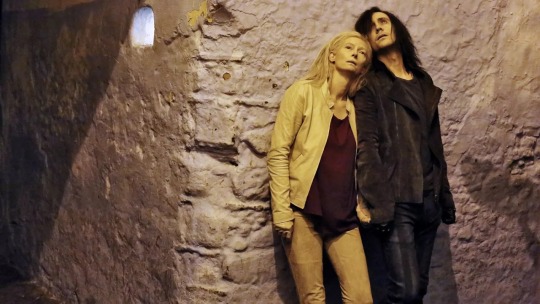
2. Only Lovers Left Alive (2013)
For a man so dedicated to being aware of the passage of time, a man with a deep appreciation for nostalgic cool of all eras, and a man with a rich and layered appreciation for art and music from across the board, it makes total sense that Only Lovers Left Alive would be a celebration of all these aspects framed as an eternal love with a deep cross-section between the original lovers and the tales of vampires. The vampiric leads allow Jarmusch the perfect vehicle to seamlessly tie stellar creativity from any point in time with a singular line, and the deep implications of our protagonists' names suggest a subtextual lore that one could likely build a cinematic universe around. For a venture with aspirations this lofty, the casting must fit the call, and the main four of Tilda Swinton, Tom Hiddleston, John Hurt and Jeffrey Wright build a solid foundational square for all characters to navigate deep emotions freely. If you’re looking for Twilight and Interview with the Vampire fare, you’ll probably long for more, but if films like Let the Right One In are more your speed, then Only Lovers Left Alive will likely be a revelation.

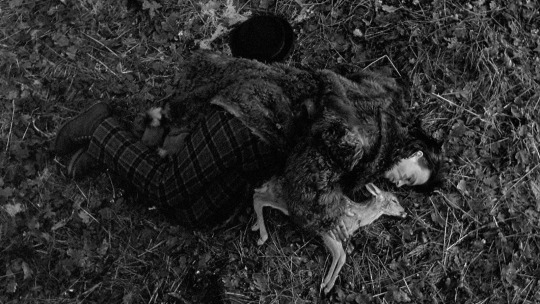
1. Dead Man (1995)
While Jim Jarmusch never lost his auteur sensibilities, Dead Man marked his initial foray into the world of larger scale traditional productions through the vehicle of the period piece. Jarmusch films were not unfamiliar with showing us a broader view of the world we know, but transposing his trademark style into the world of the Western marked a bold (but ultimately rewarding) turn. With Neil Young serving as his Ennio Morricone, Jarmusch dusted off his black and white filmmaking equipment and seemingly told the production design team to blend all of the best parts of Spaghetti Western and German Expressionism. Johnny Depp, the film’s star, was riding the wave of success afforded from What’s Eating Gilbert Grape?, Benny & Joon and Ed Wood, and Dead Man carried that momentum right along. As for his Western universe, the list of names that Jarmusch chose to populate it with is where his style stood out : Crispin Glover, John Hurt, Robert Mitchum, Iggy Pop, Gibby Haines, Gabrielle Byrne, Billy Bob Thornton, Alfred Molina and more drive home Depp’s “fish out of water” characterization convincingly. Based on its period-piece designation, Dead Man signalled a drastic leap in style utilization for Jarmusch, a creative rarified air that he would return to for several future productions.
#ChiefDoomsday#doomonfilm#JimJarmusch#PermanentVacation#StrangerThanParadise#DownByLaw#MysteryTrain#NightOnEarth#DeadMan#GhostDogTheWayOfTheSamurai#CoffeeAndCigarettes#BrokenFlowers#TheLimitsOfControl#OnlyLoversLeftAlive#Paterson#TheDeadDon'tDie
14 notes
·
View notes